The Austrian School is a heterodox school of economic thought that advocates strict adherence to methodological individualism, the concept that social phenomena result primarily from the motivations and actions of individuals and their self interest. Austrian school theorists hold that economic theory should be exclusively derived from basic principles of human action.

Friedrich August von Hayek, often referred to by his initials F. A. Hayek, was an Austrian-British polymath, whose areas of interest included economics, political philosophy, psychology, and intellectual history. Hayek shared the 1974 Nobel Memorial Prize in Economic Sciences with Gunnar Myrdal for work on money and economic fluctuations, and the interdependence of economic, social and institutional phenomena. His account of how prices communicate information is widely regarded as an important contribution to economics that led to him receiving the prize.

Murray Newton Rothbard was an American economist of the Austrian School, economic historian, political theorist, and activist. Rothbard was a central figure in the 20th-century American libertarian movement, particularly its right-wing strands, and was a founder and leading theoretician of anarcho-capitalism. He wrote over twenty books on political theory, history, economics, and other subjects.
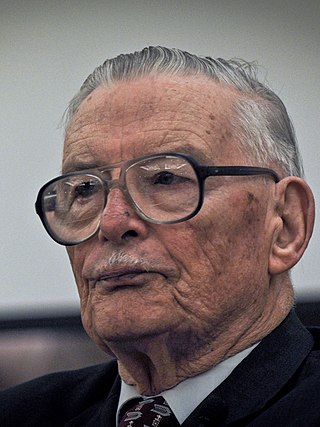
James McGill Buchanan Jr. was an American economist known for his work on public choice theory originally outlined in his most famous work, The Calculus of Consent, co-authored with Gordon Tullock in 1962. He continued to develop the theory, eventually receiving the Nobel Memorial Prize in Economic Sciences in 1986. Buchanan's work initiated research on how politicians' and bureaucrats' self-interest, utility maximization, and other non-wealth-maximizing considerations affect their decision-making. He was a member of the Board of Advisors of The Independent Institute as well as of the Institute of Economic Affairs, a member of the Mont Pelerin Society (MPS) and MPS president from 1984 to 1986, a Distinguished Senior Fellow of the Cato Institute, and professor at George Mason University.
The nirvana fallacy is the informal fallacy of comparing actual things with unrealistic, idealized alternatives. It can also refer to the tendency to assume there is a perfect solution to a particular problem. A closely related concept is the "perfect solution fallacy".
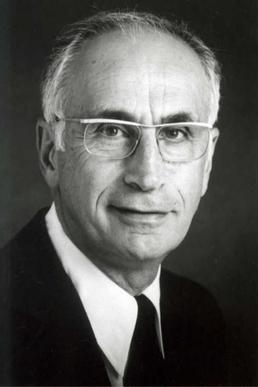
Armen Albert Alchian was an American economist. He spent almost his entire career at the University of California, Los Angeles (UCLA). A major microeconomic theorist, he is known as one of the founders of new institutional economics and widely acknowledged for his work on property rights.
Donald Charles Lavoie was an American economist of the Austrian School. He was influenced by Friedrich Hayek, Hans-Georg Gadamer, Michael Polanyi and Ludwig Lachmann. He wrote two books on the problem of economic calculation. His first book on this subject was Rivalry and Central Planning. This book stressed the importance of the process of competitive rivalry in markets. His second book was National Economic Planning: What Is Left?. This book dealt with the problem of non-comprehensive planning.
John Peter Sophocleus is an American economist and libertarian political activist.
Richard Normand Langlois is an American economist and currently professor at the University of Connecticut. He studied physics and English literature at Williams College, he received a Master's in astronomy from Yale University, and he received his PhD in Engineering-Economic Systems from Stanford.
Peter Joseph Boettke is an American economist of the Austrian School. He is currently a professor of economics and philosophy at George Mason University; the BB&T Professor for the Study of Capitalism, vice president for research, and director of the F.A. Hayek Program for Advanced Study in Philosophy, Politics, and Economics at the Mercatus Center at GMU.
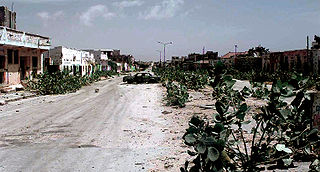
Between the fall of Siad Barre's government in January 1991 and the establishment of the Transitional National Government in 2006, there was no central government in Somalia. Large areas of the country such as Puntland and Galmudug were internationally unrecognized and administered as autonomous regions of Somalia, while forces in the northwest declared the Republic of Somaliland. The remaining areas, including the capital Mogadishu, were divided into smaller territories ruled by competing faction leaders. During this period, Somalia has been cited as a real-world example of a stateless society and a country with no formal legal system.
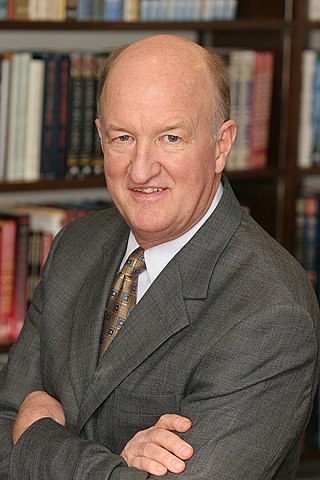
Mark Andrew Skousen is an American economist and writer. He currently teaches at Chapman University, where he has been the Doti-Spogli chair in free enterprise at the Argyros School of Business and Economics since 2022.
Whither Socialism? is a book on economics by Joseph Stiglitz, first published in 1994 by MIT Press.

Christopher J. Coyne is the F.A. Harper Professor of Economics at George Mason University and the associate director of the F. A. Hayek Program for Advanced Study in Philosophy, Politics, and Economics at the Mercatus Center.
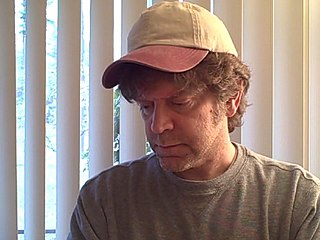
David L. Prychitko is an American economist of the Austrian School. Prychitko is a critic of Marxism, but defends the idea of workers' self-managed firms in a freed market system. Prychitko is a tenured professor at Northern Michigan University.
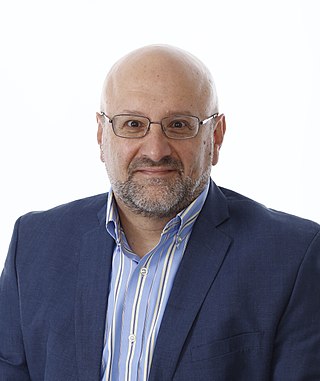
Steven G. Horwitz was an American economist of the Austrian School. Horwitz was the Distinguished Professor of Free Enterprise in the department of economics in the Miller College of Business at Ball State University in Muncie, Indiana. In 2017, he retired as the Dana Professor of Economics Emeritus at St. Lawrence University.

The Invisible Hook: The Hidden Economics of Pirates is a non-fiction book detailing the similarities between economics and piracy. Author Peter T. Leeson, shows in this book how pirates instigated democratic practices for their mutual profit, ideas which preceded the methods of society in the 16th century.
Terry Lee Anderson is an academic and author primarily focused on the intersection of economic and environmental issues in America. Anderson's works argue that market approaches can be both economically sound and environmentally sensitive. Influenced by the Austrian school of economic thought, his research helped launch the idea of free-market environmentalism and has prompted public debate over the proper role of government in managing natural resources.

Scott B. Sumner is an American economist. He was previously the Director of the Program on Monetary Policy at the Mercatus Center at George Mason University, a Research Fellow at the Independent Institute, and a professor at Bentley University in Waltham, Massachusetts. His economics blog, The Money Illusion, popularized the idea of nominal GDP targeting, which says that the Federal Reserve and other central banks should target nominal GDP, real GDP growth plus the rate of inflation, to better "induce the correct level of business investment".
Matelotage was an agreement amongst pairs of European sailors, in particular buccaneers, in the 17th and early 18th century. As part of this economic partnership, "matelots" would agree to share their incomes, and inherit their partner's property in the case of their death. In addition, they would pledge to protect and fight alongside each other in battle and otherwise act in the other's interest. Not limited to sailors or pirates, matelotage agreements could be made by members of any group, even planters.











